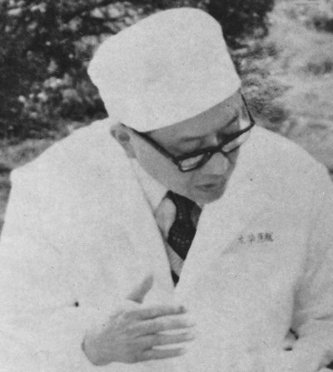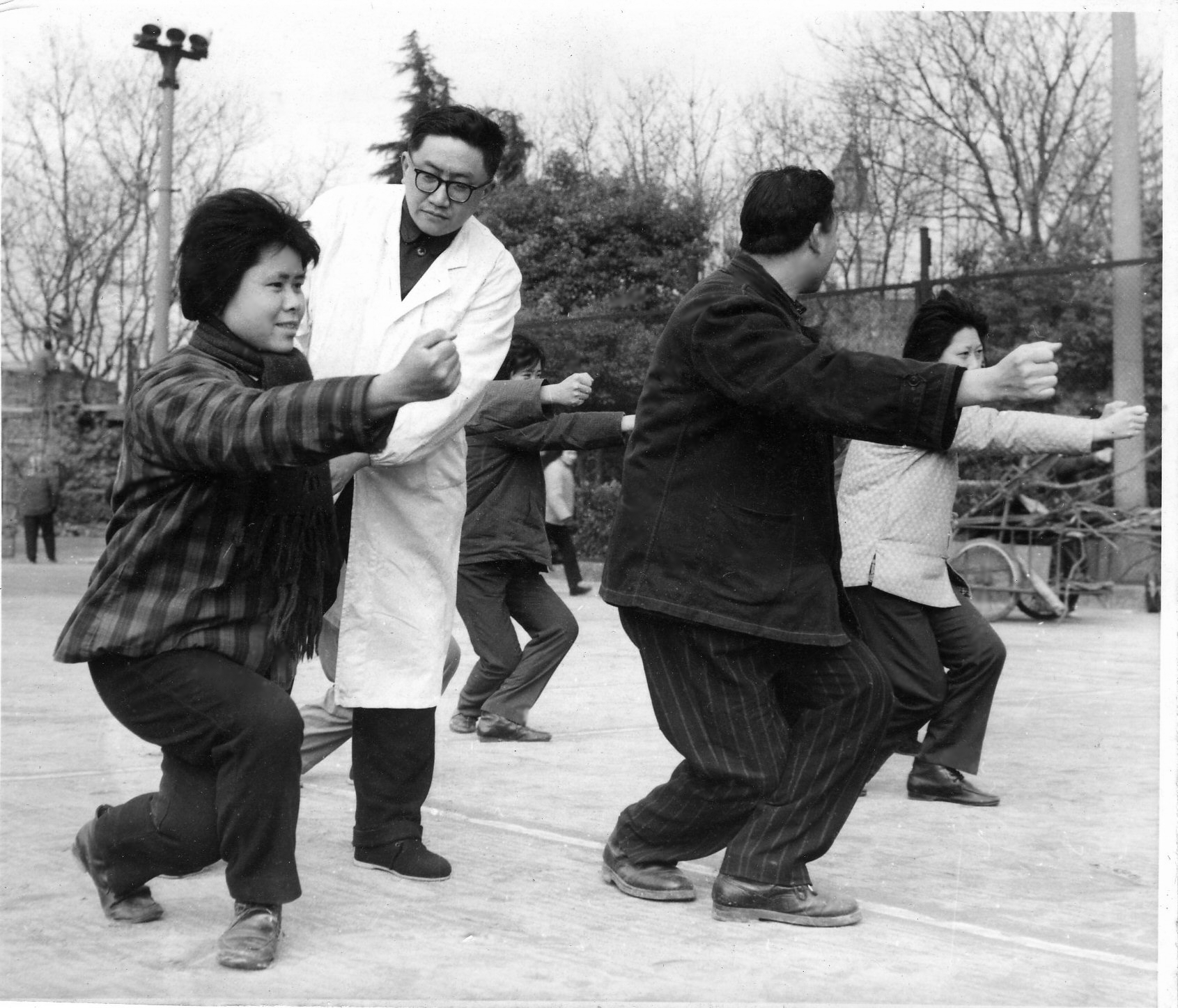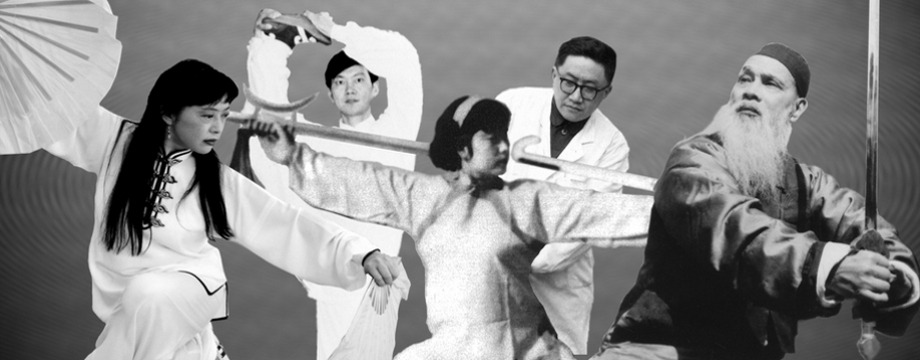
Dr. Cheng-De in 1976
Prof. and Dr. Cheng-De Wu (1930 – 2020)
中医骨伤科主任医师,王氏伤科,王氏武术,继往开来的传承者 – 吴诚德教授
(Grandmaster Helen Wu’s father)
A highly respected member of the Chinese medical community, Dr. Cheng-De Wu (b. 1930) has devoted his time and energy to promoting all aspects of the benefits of traditional Chinese medicine. Drawing on more than 40 years of clinical experience in Chinese medicine, he has devoted himself to researching and studying the benefits of Chi-Kung in helping patients improve the speed and quality of their recoveries and deal with chronic pain.
As a young boy, Cheng-De Wu enrolled in the martial arts program of Grandmaster Zi-Ping Wang. He rapidly became a well-rounded martial artist, with a fondness for the spear and the broadsword, and for wrestling. At the same time, he was fascinated by traditional Chinese medicine. After more than a decade of study, he helped Dr. Zi-Ping Wang assemble and develop the 20-postures Chi-Kung system. He was the co-author and the person responsible for publishing Twenty Therapeutic Exercises for Treating Diseases and Prolonging Life in 1958.
From 1959 until 1989, he served as Director of the Shanghai College of Traditional Chinese Medicine, as well as Professor and Medical Doctor-in-Chief of the Long Hua Hospital in Shanghai. There, he established a new clinic program, teaching patients to use Chi-Kung to strengthen and speed their recoveries. At the same time, he established morning training programs at many physical training centres in Shanghai, and trained instructors in his methods and philosophy of healing.
With the Cultural Revolution of the 1960s and 70s, professionals and scholars were subjected to humiliation, demotion, imprisonment or worse. The Communist government discouraged practice of the martial arts in the strongest terms. Wushu schools were closed and masters were forbidden to teach. Dr. Cheng-De Wu was required to perform cleaning jobs and to treat farmers in the countryside. This entailed walking up to 12 hours at a time to get from one village to the next. This extensive travelling often meant having to spend the night in temple ruins, only partially protected from exposure to the elements.
In spite of the privations and dangers of those times, he maintained a positive attitude. Rather than seeking solace in the outside world, he turned to the inner life. He took all of the indignity in stride, remaining positive and employing all of his skill and energy to help the farmers he was required to treat. As he later told me, the important thing is to really know who you are. Whether he was treating patients in a state-of-the-art hospital or in the countryside, he respected the nature of the task at hand. His patients returned that respect.
In 1989, he moved to Houston, Texas, where he opened a private practice. He continues to treat patients, combining traditional Chinese medicine, therapeutic exercises and his decades of medical experience into a powerful program that includes acupressure, acupuncture, herbology and Chi-Kung.
Dr. Cheng-De Wu, my father, has taught me to find solutions within myself during times of adversity. He has flourished even in the most challenging circumstances, and has risen to a position of immense respect in the traditional Chinese medicine. He is living proof that genuine independence and freedom come from within oneself.

Dr Wu teaching Therapeutic Chi-Kung
Dr. Wu’s titles include Director of the Shanghai Traditional Chinese Medicine Association, former Vice Chairman of the Shanghai Traditional Chinese Medicine Traumatology Association, Committee Member of the Shanghai Rehabilitation Medicine Association and Committee Member of the Shanghai Sports Medicine Association. Dr. Wu holds an Honours Degree of Doctor of Science from Eurotechnical Research University. He is a Committee Member of the All China Wushu Society, Advisor to the U.S.A. Wushu Kung Fu Federation and Honorary Advisor to the Martial Arts of China Historical Society. He has published a number of books, articles and University teaching materials on traditional Chinese medicine and Chi-Kung.
吴诚德教授曾任上海中医学院中医教授,伤科教研室主任、附属龙华医院主任医师、伤科主任,曾任中华全国中医学会骨伤科学会委员,上海中医学会理事、骨伤科学会副主任委员、上海中华医学会人体软组织损伤研究会副主任委员、上海运动医学分会委员、康复医学分会委员。
他自幼师从武林泰斗、伤科专家王子平,习武、学医,并在几十年临床实践与高等学院的教学中,把王氏伤科的宝贵经验系统化,专业化,并在科学研究的基础上,著书立说,攥写了第一版全国中医学院统编教材(中医伤科学);《中医骨伤科学基础》、《中医内伤学》、并任第一、第二版主编及第五版的副主编。他对王氏伤科的传承,继往开来,确立了王氏伤科在中医骨伤科领域中的不可忽略学术地位。
几十年来,吴诚德教授武医结合,曾任中国武术学会委员,武术医学研究会副会长。60年代曾兼任上海高校武术队、上海中医学院武术队主教练、上海扬子江武功医疗研究会顾问及上海市与华东区武术、太极拳比赛裁判长等。并主编了《武术伤科》、《祛病延年二十式》、《练功与养生》、《王子平与武术》、《武术泰斗教你学拳》、《王子平拳术套路拳术精选》等丛书。
1989年退休赴美,曾任美国国家武术总会顾问、世界中医骨伤科联合会首席总顾问、休士顿中国武术与中医学院顾问、国际武术散手道联盟荣誉顾问,现任休士顿太极功夫健康学院中医(针灸、伤科、气功)顾问,任全美武术太极比赛仲裁多年;2007年被评为“世界十大武术名医”;2008年他与夫人王菊蓉教授(原上海体育学院武术教授,中国全国及上海市政协委员,新中国第一代女武术家)同时被评为“世界武林百杰”,同年双双又被国际武术散手道联盟授予“黑带九段”荣誉称号。

